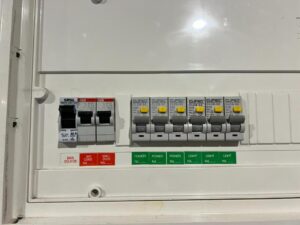Yes, you should turn off breakers during a power outage since it can stop power surges from damaging appliances. Furthermore, it can minimise the risk of electrical fires and help you identify possible issues in your electrical system.
Professional electrical contractors know that switching off the breakers during an outage is essential for keeping the electrical system safe and efficient.
In this post, we’ll discuss the crucial steps to take during a power outage, its common causes, and how to prepare for it.
3 Crucial Steps to Do During a Power Outage
The 3 crucial steps to do during a power outage are to confirm the outage, switch off appliances, and use a torch for lighting.
Step 1: Confirm the Outage
Firstly, check whether the power cut is limited to your property or if it’s a widespread issue. Look outside to see if street lights or neighbouring homes are also without electricity. If it’s just your property, examine your fuse box for any tripped switches or blown fuses.
Step 2: Switch Off Appliances
Once you’ve ascertained it’s an outage, turn off and unplug electrical devices, especially those that generate heat or have sensitive electronic components. This action prevents potential damage when power returns.

Step 3: Use a Torch for Lighting
For illumination, rely on a torch rather than candles to minimise fire hazards. Ensure you have spare batteries at hand. It’s advisable to keep torches in easily accessible places around your home for such emergencies.
Ever asked, “Why does my breaker keep tripping with nothing plugged in?” Read our blog to learn the answer.
3 Common Causes of a Power Outage
The 3 common causes of a power outage are bad weather conditions, damaged power lines, and substation issues.
- Bad weather conditions: Lightning, strong winds, and storms can usually disrupt power supply by damaging infrastructure.
- Damaged power lines: Construction work or accidents that affect power lines can result in tripped breakers and power outages.
- Substation issues: Problems within substations, which distribute single-phase and three-phase power, can easily lead to widespread outages.
Can I Prepare for a Power Outage?
Yes, you can prepare for a power outage by making sure you have a well-stocked emergency kit nearby. This pack needs to have batteries, first aid items, non-perishable food, and torches. You’re also advised to regularly check and maintain your home’s electrical system. This includes testing your safety switches and ensuring your breakers are functioning right.
You can invest in a backup power source as an additional tip for power outages. A charged power bank or generator vital devices that can make prolonged outages more bearable.






